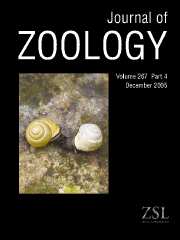Crossref Citations
This article has been cited by the following publications. This list is generated based on data provided by
Crossref.
Boletzky, S.v.
2003.
Vol. 44,
Issue. ,
p.
143.
2005.
Cephalopods.
p.
373.
Ortiz, Nicolás
Ré, María Edith
and
Márquez, Federico
2006.
First description of eggs, hatchlings and hatchling behaviour of Enteroctopus megalocyathus (Cephalopoda: Octopodidae).
Journal of Plankton Research,
Vol. 28,
Issue. 10,
p.
881.
Pecl, Gretta T.
and
Jackson, George D.
2008.
The potential impacts of climate change on inshore squid: biology, ecology and fisheries.
Reviews in Fish Biology and Fisheries,
Vol. 18,
Issue. 4,
p.
373.
Villanueva, Roger
Quintana, Daniel
Petroni, Giuliano
and
Bozzano, Anna
2011.
Factors influencing the embryonic development and hatchling size of the oceanic squid Illex coindetii following in vitro fertilization.
Journal of Experimental Marine Biology and Ecology,
Vol. 407,
Issue. 1,
p.
54.
Jiménez-Prada, Pablo
Scherbakova, Anastasia
Riera, Rodrigo
Felipe, Beatriz C.
Sykes, António V.
Gonçalves, Rui A.
Andrade, José P.
Perales-Raya, Catalina
Rodríguez, Covadonga
and
Almansa, Eduardo
2014.
Characterization of deformed hatchlings of Octopus vulgaris obtained under captivity from a small female.
Fisheries Research,
Vol. 152,
Issue. ,
p.
62.
Villanueva, Roger
Vidal, Erica A. G.
Fernández-Álvarez, Fernando Á.
Nabhitabhata, Jaruwat
and
Kiel, Steffen
2016.
Early Mode of Life and Hatchling Size in Cephalopod Molluscs: Influence on the Species Distributional Ranges.
PLOS ONE,
Vol. 11,
Issue. 11,
p.
e0165334.
Chemshirova, Irina
Hoving, Henk-Jan
and
Arkhipkin, Alexander
2021.
Temperature effects on size, maturity, and abundance of the squid Illex argentinus (Cephalopoda, Ommastrephidae) on the Patagonian Shelf.
Estuarine, Coastal and Shelf Science,
Vol. 255,
Issue. ,
p.
107343.
Tajika, Amane
Landman, Neil H.
Slovacek, Mariah
Nishida, Kozue
Morita, Wataru
and
Witts, James D.
2022.
Intra- and interspecific variability in offspring size in nautilids.
Lethaia,
Vol. 55,
Issue. 3,
p.
1.
Laptikhovsky, Vladimir
Allcock, A Louise
Barnwall, Leigh
Barrett, Christopher
Cooke, Gavan
Drerup, Christian
Firmin, Christopher
Lozach, Sophie
MacLeod, Eleanor
Oesterwind, Daniel
Petroni, Michael
Robin, Jean-Paul
Sheerin, Edel
Power, Anne-Marie
Pierce, Graham J
and
Arkhipkin, Alexander
2022.
Spatial and temporal variability of spawning and nursery grounds of Loligo forbesii and Loligo vulgaris squids in ecoregions of Celtic Seas and Greater North Sea.
ICES Journal of Marine Science,
Vol. 79,
Issue. 6,
p.
1918.
Marcout, Anna
Foucher, Eric
Pierce, Graham J.
and
Robin, Jean-Paul
2024.
Impact of environmental conditions on English Channel long-finned squid (Loligo spp.) recruitment strength and spatial location.
Frontiers in Marine Science,
Vol. 11,
Issue. ,
Durante, Erica D
Grammer, Gretchen L
Martino, Jasmin C
Payne, Justin L
Doubleday, Zoë A
and
Arkhipkin, Alexander
2024.
Nondaily growth increments in the commercial species, Octopus berrima, and the importance of age validation.
ICES Journal of Marine Science,
Vol. 81,
Issue. 2,
p.
293.
Murata, Ryosuke
Kubo, Umina
Yoshida, Shoma
Mushirobira, Yuji
and
Soyano, Kiyoshi
2024.
Water temperature effects on embryonic development and GnRH-like expression in kisslip cuttlefish (Sepia lycidas) hinting the potential role of GnRH-like peptide.
Comparative Biochemistry and Physiology Part A: Molecular & Integrative Physiology,
Vol. 296,
Issue. ,
p.
111681.

